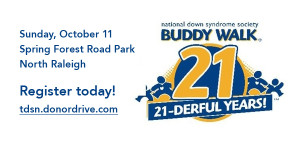Wake Forest Montessori supports the 21st Annual Buddy Walk that will take place on Sunday October 11th from 1:00pm to 4:00pm.
Event Details:
| Where | Spring Forest Road Park Raleigh, NC |
| Starts | 10/11/2015 @ 1:00 pm |
| Ends | 4:00 pm |
| Check-in Time | 1:00 pm to 3:00 pm |
| Registration Cutoff | 10/08/2015 12:00 am |
| Donation Cutoff | 01/31/2016 12:00 am |
| Contact | Lindsay Tipton |
| Phone | 919-803-0515 |
| Email Address | lindsay@triangledownsyndrome.org |
More about Down Syndrome
Down syndrome is the most commonly occurring genetic condition at 1 in every 691 births. Down syndrome occurs in people of all races and economic levels. More than 400,000 people in the United States are living with the condition. TDSN supports nearly 1,000 families in the Eastern Carolina areas. Down syndrome is not a disease and people do not suffer from it. They are born with Down syndrome and will have it their whole life. They cannot give it to someone else and they cannot be cured of it.
The vast majority of individuals with Down syndrome (approximately 95 percent) have an extra 21 chromosome. Instead of the normal number of 46 chromosomes in each cell, the individual with Down syndrome has 47 chromosomes. This condition is called trisomy 21.
People with Down syndrome have an increased risk for certain medical conditions such as congenital heart defects, gastrointestinal issues, respiratory difficulty, hearing and vision problems, Alzheimer’s disease, childhood leukemia, and thyroid conditions. However, many of these conditions are now treatable, so most people with Down syndrome lead healthy lives. Life expectancy for people with Down syndrome has increased dramatically in recent decades – from 25 in 1983 to 60 today.
People with Down syndrome experience cognitive delays in the mild to moderate range. It’s important to remember that IQ is not indicative of the many strengths and talents that each individual possesses. Individuals with Down syndrome are achieving at levels we never once thought possible.
Quality educational programs, a stimulating home environment, good health care, and positive support from family, friends and the community enable people with Down syndrome to develop their full potential and lead fulfilling lives. People with Down syndrome are attending college, marrying and working competitively in their communities in increasing numbers.
For More information please visit: http://www.triangledownsyndrome.org/

